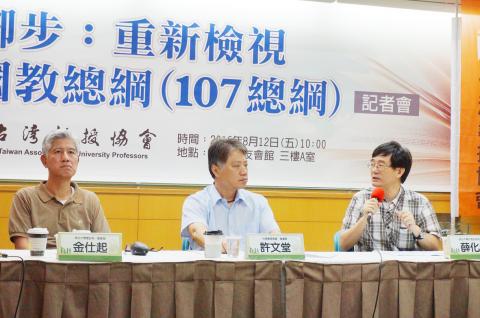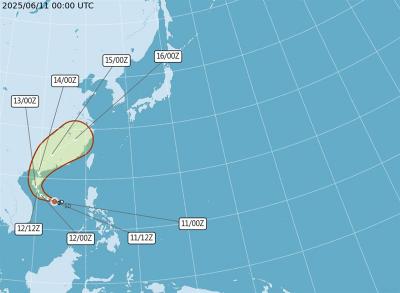Mandatory Confucian classics and military training courses should be removed from pending high-school curriculum guidelines, members of the Taiwan Association of University Professors said yesterday, adding that the new guidelines allow language courses to unduly dominate at the expense of social studies and natural sciences.
“Instead of being above-board and listing ‘basic Chinese cultural education materials’ (中華文化基本教材) as a required course, new guidelines mandate that students have to take at least 24 credits of both elective and mandatory Chinese-language courses, effectively inserting the ‘basic Chinese cultural education materials’ into requirements,” Fu Jen Catholic University philosophy professor Shen Ching-kai (沈清楷) said.
Ministry of Education guidelines mandate 20 credits of “mandatory” Chinese language courses, with the four credit “materials” courses the only electives mandated, he said.

Photo: Tu Chu-wen, Taipei Times
The “materials” consist of selections from the canonical Confucian classics The Analects (論語), Mencius (孟子), Great Learning (大學) and Doctrine of the Mean (中庸), which comprise the “Four Books” chosen by the Sung Dynasty’s Zhu Xi (朱熹) to serve as a basic introduction to Confucian thought.
While study of the “Four Books” has been a mandatory component of Chinese language education for most of the nation’s history, the “materials” were briefly converted into elective courses before being reinserted into requirements in 2012.
“These materials aren’t representative of ‘China’ or ‘culture’ because they focus on Confucianism at the expense of Taoism and other traditions,” Shen said. “We also have new immigrants and Aborigines — why don’t the requirements use their cultures’ ‘basic materials’?”
The inclusion of “basic materials” courses in requirements reflected a broader dominance of language courses in the new requirements, which preserve the 38 credits previously allocated for English and Chinese-language courses, while cutting credits for social studies and natural sciences.
While schools are to be allowed to individually mandate additional requirements, current ministry guidelines guarantee students a minimum of only 30 credits in natural science and social studies combined, raising the possibility some schools will neglect these areas, he said.
The new guidelines are part of implementation plans for mandatory 12-year education.
National Chengchi University history professor Ching Shih-chi (金仕起) criticized the guidelines’ continued inclusion of a mandatory “national defense education” (全民國防教育) course in place of a previous military training course as preserving a “relic of authoritarianism,” which was a “waste of time.”
“Given that the ministry has promised to remove military instructors from schools within five years, we don’t see why this course is still included,” he said.
“They’re making this a required course, but they don’t have any measures in place to prepare new instructors — so the likely result will be that the military instructors will continue to teach the course as before,” National Chengchi University history professor Hsueh Hua-yuan (薛化元) said. “If this part isn’t reformed, you won’t be able to just tell military instructors to leave campuses, because there’s no one else who will be able to teach their course.”
The academics also criticized plans for “hasty implementation” of social studies credit cuts, which are scheduled to go into effect simultaneously with other changes in 2018, even though formal new social studies curriculum standards have yet to be promulgated following an extended battle over allegedly “pro-China” shifts in tone under the previous administration.

A magnitude 6.4 earthquake struck off the coast of Hualien County in eastern Taiwan at 7pm yesterday, the Central Weather Administration (CWA) said. The epicenter of the temblor was at sea, about 69.9km south of Hualien County Hall, at a depth of 30.9km, it said. There were no immediate reports of damage resulting from the quake. The earthquake’s intensity, which gauges the actual effect of a temblor, was highest in Taitung County’s Changbin Township (長濱), where it measured 5 on Taiwan’s seven-tier intensity scale. The quake also measured an intensity of 4 in Hualien, Nantou, Chiayi, Yunlin, Changhua and Miaoli counties, as well as

Taiwan is to have nine extended holidays next year, led by a nine-day Lunar New Year break, the Cabinet announced yesterday. The nine-day Lunar New Year holiday next year matches the length of this year’s holiday, which featured six extended holidays. The increase in extended holidays is due to the Act on the Implementation of Commemorative and Festival Holidays (紀念日及節日實施條例), which was passed early last month with support from the opposition Chinese Nationalist Party (KMT) and Taiwan People’s Party. Under the new act, the day before Lunar New Year’s Eve is also a national holiday, and Labor Day would no longer be limited

The first tropical storm of the year in the western North Pacific, Wutip (蝴蝶), has formed over the South China Sea and is expected to move toward Hainan Island off southern China, the Central Weather Administration (CWA) said today. The agency said a tropical depression over waters near the Paracel and Zhongsha islands strengthened into a tropical storm this morning. The storm had maximum sustained winds near its center of 64.8kph, with peak gusts reaching 90kph, it said. Winds at Beaufort scale level 7 — ranging from 50kph to 61.5kph — extended up to 80km from the center, it added. Forecaster Kuan Hsin-ping

COMMITMENTS: The company had a relatively low renewable ratio at 56 percent and did not have any goal to achieve 100 percent renewable energy, the report said Pegatron Corp ranked the lowest among five major final assembly suppliers in progressing toward Apple Inc’s commitment to be 100 percent carbon neutral by 2030, a Greenpeace East Asia report said yesterday. While Apple has set the goal of using 100 percent renewable energy across its entire business, supply chain and product lifecycle by 2030, carbon emissions from electronics manufacturing are rising globally due to increased energy consumption, it said. Given that carbon emissions from its supply chain accounted for more than half of its total emissions last year, Greenpeace East Asia evaluated the green transition performance of Apple’s five largest final